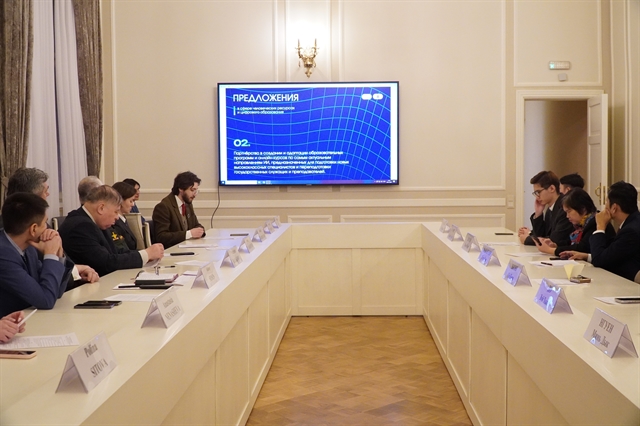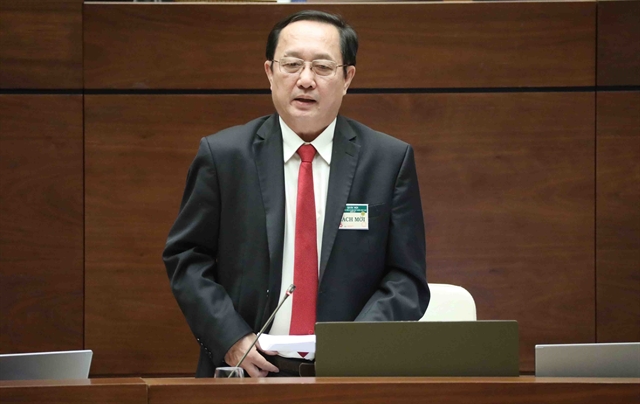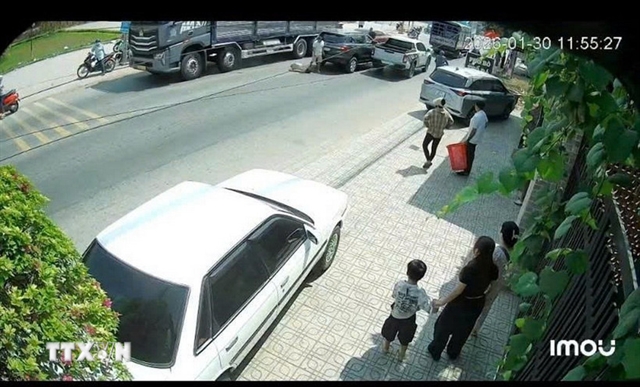 Politics & Law
Politics & Law

 |
| Huỳnh Thanh Đạt, Minister of Science and Technology answered questions at the session. — VNA/VNS Photo Minh Đức |
HÀ NỘI — "Please have trust in our scientists," Huỳnh Thanh Đạt, Minister of Science and Technology told the National Assembly on Wednesday.
A record of more than 120 delegates questioned Minister Đạt in his two-hour session concerning issues around science and technology.
Trần Thị Diệu Thúy, Chairwoman of the Hồ Chí Minh City Labour Federation, believes that one of the factors for implementing the strategy of scientific and technological development and innovation is the participation of researchers and scientists.
However, Thuý also said that in addition to the support of the scientific community for this strategy, the HCMC Labour Federation hope that the Government will have specific mechanisms and accept risks in science, and remove administrative barriers in scientific management and research. Thuý asked Đạt for the ministry's solutions.
In his answer, Đạt stated that in 2023, the Ministry of Science and Technology (MoST) is amending the regulations on the management of scientific and technological research projects in a coordinated and integrated manner.
MoST has formed a task force to tackle this issue and developed fundamental regulations. Recently, five new regulations have been issued to restructure national science and technology programmes.
Many past regulations have been abolished, such as the requirement that scientists who do not achieve satisfactory research results in their projects cannot participate in scientific and technological tasks for the next two years.
Regarding this abolishment, Đạt said: "We are very aware of the characteristics, risks and latency of sci-tech."
Previously, if a scientist failed to fulfill their scientific tasks, they would be disqualified from registering for the following two years, and the leading unit would also be affected.
This caused significant concerns among scientists as it creates obstacles since scientific research can result in success or failure, and success can come sooner or later, the Minister further explained.
Đạt stated that on May 17, Prime Minister Phạm Minh Chính emphasised the need to accept risks and delays in scientific research, in his speech at the conference on the 60th anniversary of late President Hồ Chí Minh's first visit to MoST.
"I strongly resonate with the Prime Minister's statement that science is the shortest path to prosperity," said Đạt, adding that his ministry is encouraging scientists to actively engage in scientific research and innovation.
"I hope that authorities at all levels will have even greater trust in scientists, delegate authority, and provide them with appropriate powers, mechanisms, and policies to unleash their capabilities and dedication."
Internationally competitive
Delegate Trần Thị Hồng Thanh of Ninh Bình Province pointed out the reality of developing the science and technology market. Since 2011, the State management machinery for science and technology has been reorganised from Central to local levels, and many policies have been issued. However, the science and technology market still faces limitations.
"Minister, what are the reasons for the underdevelopment of the science and technology market, and what are the fundamental solutions?" questioned Thanh.
In his answer, Đạt stated that the ministry has issued various regulations and circulars to promote the transfer of science and technology, resulting in the application of new and advanced technologies in sectors such as healthcare, telecommunications, and transportation. Some sectors have international competitiveness and deep involvement in the application chain.
The linkage between universities and businesses is a solution to enhance the quality of education and technology transfer. However, deputy Nguyễn Đại Thắng of Hưng Yên Province mentioned that there are still many limitations in this regard. He suggested that the minister present measures to resolve these obstacles.
The Minister of Science and Technology expressed deep concern about this issue. In the past, universities operated separately, and businesses operated independently, lacking organic and effective connections. Recently, the State has set guidelines, policies, and mechanisms to bring these two sectors closer together.
Removing bottlenecks
National Assembly Chairman Vương Đình Huệ asked the Government, ministers and relevant agencies to remove bottlenecks of the national target programmes after the question-and-answer session with Minister - Chairman of the Government’s Committee for Ethnic Minority Affairs Hầu A Lềnh on Tuesday afternoon and Wednesday morning.
Lềnh was asked about ethnic minority issues such as the committee’s responsibility and the coordination among ministries and sectors in implementing the national target programmes on new-style rural area building for 2021-25, sustainable poverty reduction for 2021-25, and socio-economic development in ethnic minority and mountainous areas for 2021-30.
He also fielded questions about the attraction of resources for developing mountainous and disadvantaged areas and areas home to ethnic groups and the settlement of residential and production land-related shortages facing ethnic minorities, shifting cultivation and deforestation.
Deputy PM Trần Lưu Quang who also joined the session claimed his responsibility for the slow progress of the national target programme for socio-economic development in mountainous areas and areas home to ethnic groups in the first phase from 2021 to 2025.
NA Chairman Huệ said policies targeting ethnic groups remain scattered and not effective. The implementation of national target programmes, including the national target programme for socio-economic development in ethnic minorities and mountainous areas, is behind schedule.
The mobilisation of sources for the programmes faces difficulties, he said.
He cited the fact that many ethnic families do not fully access social welfare policies as they have not had household registration. Natural disasters and diseases that affect local livelihoods and production also have huge impacts on the implementation of ethnic policies and national target programmes.
He asked for mobilising all resources to make investments in the socio-economic development of ethnic minorities and mountainous areas, focusing on extremely disadvantaged areas, at the same time, making amendments to inappropriate regulations that slow down the progress. — VNS




